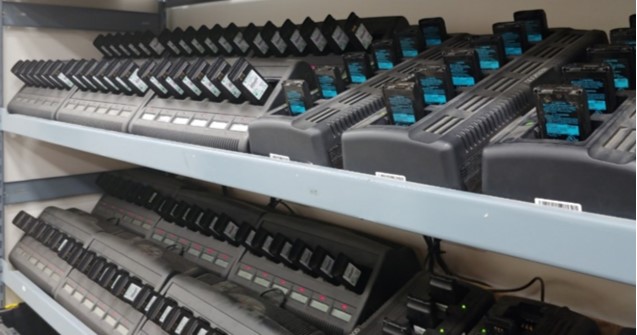
In today’s interconnected world, effective communication lies at the heart of every successful endeavor. Whether it’s coordinating tasks at a construction site in Edmonton, ensuring public safety in Calgary, or optimizing logistics in a sprawling warehouse in Western Canada, clear and reliable communication is non-negotiable.
Among the array of communication tools available, two-way radios have stood the test of time as an essential solution for seamless and instant communication in various industries. In this blog, we’ll delve into the different types of two-way radios – portable radios, mobile radios, and desktop base stations – and explore the industries that can benefit from each.
Portable Radios: Compact and Nimble Communication Solutions
Public Safety and Emergency Services
In the realm of public safety and emergency services, where swift communication can make the difference between life and death, portable radios play a pivotal role. Police officers, firefighters, and emergency medical personnel rely on these devices to coordinate responses and share critical information. Their compactness enables responders to communicate hands-free, allowing them to focus on their tasks while staying connected to their team.
Hospitality and Event Management
Recreation
Portable two-way radios offer a myriad of advantages for recreational facilities. Whether it’s a sprawling amusement park, a scenic campground, or an adventurous outdoor adventure center, these radios facilitate instant communication among staff members. Lifeguards can coordinate poolside activities, park attendants can swiftly respond to guest inquiries, and trail guides ensure the safety of their groups.
Beyond the operational realm, portable radios contribute to the overall visitor experience. By enabling prompt response to requests, concerns, and emergencies, they enhance customer satisfaction and bolster the reputation of the facility. Additionally, these radios foster a sense of security among guests, knowing that trained personnel are just a radio call away.
Mobile Radios: Communication on the Move
Transportation and Logistics
In the fast-paced world of transportation and logistics, mobile radios facilitate efficient communication across a fleet of vehicles. Truck drivers, delivery personnel, and logistics coordinators rely on these radios to maintain real-time communication with their central hub. This aids in route optimization, coordination of deliveries, and swift response to any unforeseen challenges on the road.
Construction and Manufacturing
Within the construction and manufacturing sectors, mobile radios offer a vital communication link between supervisors, equipment operators, and site managers. These radios enable real-time updates on project progress, safety alerts, and equipment maintenance requirements.
In large construction sites or sprawling manufacturing facilities, where distances are considerable, mobile radios ensure crucial information is communicated promptly.
Desktop Base Stations: Anchors of Communication
Utilities and Energy Sector
Large-Scale Operations
Industries involved in large-scale operations, such as mining and large-scale event management, can also reap the benefits of desktop base stations. These stations offer extended communication ranges and can serve as command centers for comprehensive communication management. In mining operations, where subterranean conditions may impede direct communication, desktop base stations provide a lifeline for coordination and safety.
Contact Tridon Communications Today
In the diverse landscape of communication solutions, two-way radios stand out as versatile tools that cater to the distinct needs of various industries. Portable radios offer mobility and instant communication for professionals on the move, such as public safety officers, recreation, and hospitality staff. Mobile radios, on the other hand, cater to those in transportation and construction, ensuring seamless communication across wide areas. Meanwhile, desktop base stations provide centralized communication hubs for industries with fixed locations and large-scale operations.
As you’ve explored the different types of radios and their applications across industries, it’s evident that effective communication is a cornerstone of success. Choosing the right radio type depends on factors such as mobility requirements, communication range, and the need for centralized communication hubs. For more information on the optimal two-way radio solution for your industry’s unique requirements, contact Tridon Communications today.



